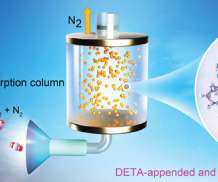Researchers use melamine to create effective, low-cost carbon capture; potential tailpipe application
Green Car Congress
AUGUST 5, 2022
The process for synthesizing the melamine material, published in an open-access paper in the journal Science Advances , could potentially be scaled down to capture emissions from vehicle exhaust or other movable sources of carbon dioxide. The low cost of porous melamine means that the material could be deployed widely.































Let's personalize your content